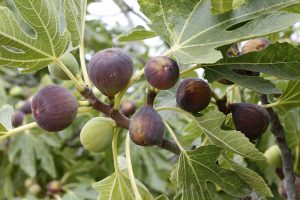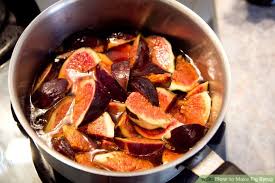The Health benefits of Figs
Native to the Mediterranean, the edible fig (Ficus carica) has been cultivated and enjoyed for centuries. Figs ripen on the tree and don’t ship well, so the best way to truly enjoy a fresh fig is from your local market, or better yet, your own fig tree. Luckily, Florida offers the right growing conditions and figs are fairly easy to grow in north and central Florida. Figs come into season July through October in our area, depending on the type of fig tree and the amount of sun it receives.
central Florida. Figs come into season July through October in our area, depending on the type of fig tree and the amount of sun it receives.
Figs are high in digestive enzymes, they contain the three components of a good diet; proteins, carbohydrates, and fats. Figs are good for weight control, fresh or dried; they are high in fiber. The nutrients from figs are absorbed by the body more slowly making people feel more satisfied.
Figs are also good for insomnia. They contain a nutrient called tryptophan. This promotes good sleep and helps the brain use sugars properly; it also encourages and stimulates good circulation throughout the body.
Figs are a healing fruit and the health benefits of eating figs are amazing. They are helpful for asthma, bronchitis, constipation, diabetes, piles, heart disease, lowering cholesterol, anemia, and high blood pressure. They are high in vitamins A, B, C, potassium, dietary fiber, magnesium, and high in calcium so they help develop strong bones, (making it an excellent source of calcium for those who are lactose intolerant).
Figs are very cleansing to the kidneys and remove poisons from them. Figs generate heat and pass quickly through the intestines. Figs are also known to clear chronic coughs and clear blockages. If eaten on an empty stomach with almonds and walnuts, will provide a complete meal.
Here are a few facts about Figs;
Figs are good for pregnant and nursing mothers because they reduce acid levels, provide richness to the diet and increase energy. During bouts of fever a small amount of a fig chewed by the patient can bring relief from dryness of the mouth.
According to Japanese scientist, figs and fig syrup are good for shrinking tumors; Have anti ulcer and antibacterial properties; Useful for mental illness when taken daily; Clears obstructions in the liver, gallbladder, and kidney’s; Relieves inflammation in the kidneys and bladder; Good for sore throats because they are high in mucilage which helps to protect a sore throat. A mixture of figs and honey is very good for coughs. A mixture of powdered fenugreek seeds, honey and figs are helpful for bronchial Asthma
Planting and Care
Bare-root figs can be planted anytime during the dormant season, but late winter or early spring is best; container-grown plants can be planted any time of the year. Fruit ripens between July and October and their size and taste varies according to the variety.
When planting, choose a location that receives full sun all day. Be aware that fig trees will often shade out competing vegetation below the tree canopy. Figs will not tolerate excessively wet soil, but need plenty of water during the fruiting season. Using mulch will help retain soil moisture. It will also deter root-knot nematodes; this pest is a major threat to fig production in Florida. Fig rust disease can also be a problem.
Since the fruit forms on terminals of wood from the year before, prune your fig only to maintain the preferred size. If you choose to prune, do so only after the fruit ripens, early in the summer; a heavy winter pruning has the potential to eliminate the next year’s crop.
Figs tolerate temperatures down to 18 degrees. If your tree suffers from freeze damage, it will regrow in bush form. Freeze-damaged wood should be pruned away once when regrowth begins.
Fig Syrup Recipe:
1 dozen figs, stems removed and quartered
1 cup demerara sugar
1/2 cup water
Combine all ingredients in a small saucepan over medium-high heat. Stir until sugar starts to dissolves and figs begin to soften. Mash figs to incorporate. Once all of the sugar has dissolved and figs are breaking apart, remove from heat and allow to sit, covered, for 30 minutes. Strain into a clean jar, cover and keep refrigerated for up to 2 weeks.


Im thankful for the post. Really thank you! Really Great. Nona Brendan Costa
I really enjoy the blog post. Thanks Again. Awesome. Cleo Dalis Minnnie
Very interesting information!Perfect just what I was searching for! Elsinore Kendall Alinna